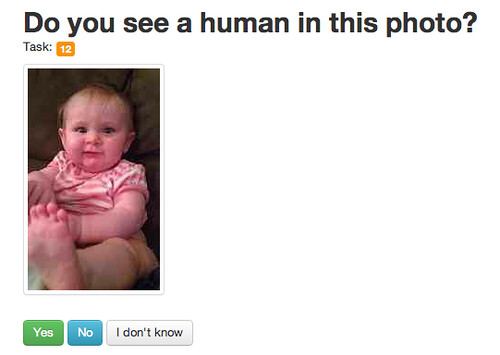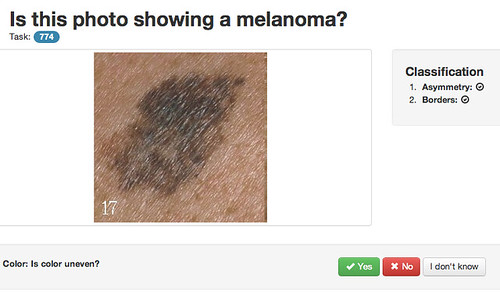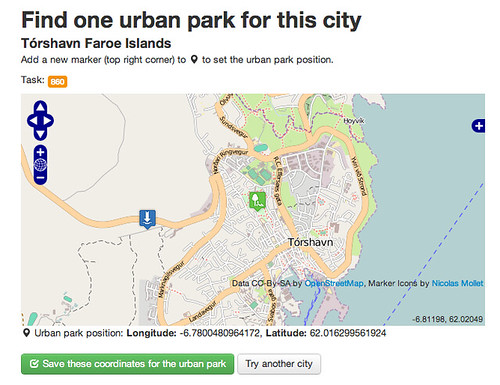For a while now our network has been working on applications, tools and platforms for crowd-sourcing and micro-tasking. At the end of last year, we posted about a cute little app developed at a hackday called the Data Digitizer that was being used to transcribe Brazillian budgetary data.
In recent months we’ve been working closely with the Citizen Cyberscience Center on an exciting new platform called PyBossa. In a nut-shell, PyBossa is a free, open-source crowd-sourcing and micro-tasking platform. It enables people to create and run projects that utilise online assistance in performing tasks that require human cognition such as image classification, transcription, geocoding and more. PyBossa is there to help researchers, civic hackers and developers to create projects where anyone around the world with some time, interest and an internet connection can contribute.
There is already a wealth of such projects, including long-running ones such as FreeBMD – a huge effort to transcribe the Civil Registration of births, marriages and deaths in the UK – as well as more recent ones such as GalaxyZoo – a hugely successful project based on volunteer efforts to classify photographs of galaxies taken by the Hubble telescope.
With PyBossa we want to make the creation of such potentially transformative projects as easy as possible and so PyBossa is different to existing efforts:
- It’s a 100% open-source
- Unlike, say, “mechanical turk” style projects, PyBossa is not designed to handle payment or money — it is designed to support volunteer-driven projects.
- It’s designed as a platform and framework for developing deploying crowd-sourcing and microtasking apps rather than being a crowd-sourcing application itself. Individual crowd-sourcing apps are written as simple snippets of Javascript and HTML which are then deployed on a PyBossa instance (such as PyBossa.com). This way one can easily develop custom apps while using the PyBossa platform to store your data, manage users, and handle workflow.
You can read more about the architecture in the PyBossa Documentation and follow the step-by-step tutorial to create your own apps.
Demos
PyBossa currently comes with several demo applications that showcase two types of projects:
- Flickr Person Finder and Melanoma: both examples of image classification projects
- Urban Parks: an example of a geocoding application
Flickr Person shows how easily you can create a project where you have a set of photos or figures that need a classification or a description of the photo. In this demo application, the latest 20 published public photos from Flickr are used as input for the volunteers where they will have to answer a simple question: Do you see a human in this photo?
The demo project Melanoma comes from an idea conceived by a team at Sage Bionetworks. Melanoma is one of the most life-threatening forms of cancer and its incidence is on the rise. It is often difficult for medical professionals to determine if a skin lesion is cancerous or not, but if diagnosed early patients have a 95% chance of survival. Advances in computer-aided image manipulation have improved the diagnostic process, but the hope is that the combination of these techniques and crowd-sourcing will improve these techniques further making early diagnosis more common.
In the demo you are asked to say if a skin lesion shows signs of being cancerous, and are taken through the various key questions: is it asymmetrical?, are its borders blurred?, is its colour uneven? and is it bigger than 6mm in diameter?. The plan is to extend this demo into a project that will help citizens recognise the early signs of skin cancer and also enable scientists to evaluate the role of crowd-sourcing in medical diagnosis.
Urban Parks is a rather different kind of project. It shows a web mapping tool where volunteers are asked to locate an urban park for a given city. The goal is to show how web mapping tools can be used to address tasks like geo-locating items in a map.
If you want to try the demos and PyBossa, go to PyBossa.com and get clicking. If you are interested in the framework you can download the source code from the Github repo and access the documentation here.
The Future
The focus on PyBossa has initially been on online citizen science projects, but it could have important applications in a host of other domains. For one, PyBossa could be used to help transcribe handwritten manuscripts of historical significance and contribute to existing efforts to make more of our shared cultural heritage available for free online and in a structured form.
We have no doubt that there are hundreds of other use-cases for PyBossa which we haven’t conceived of yet, and we’re looking forward to seeing the unexpected projects that emerge from it.
Call to action
Does PyBossa sound like something you’d like to get involved in? If so…
- Start doing some tasks
- Check out and fork the code over on the PyBossa Github repo
- Join the conversation on the Open Knowledge Foundation Labs mailing list or ping PyBossa on Twitter
- Write a new microtasking / crowdsourcing app
For any questions that you would like to address directly to the development team please use info [at] pybossa.com
Sam is a data trainer and wrangler at Open Knowledge. He Tweets from @Noel_Mas













1 thought on “Introducing PyBossa – the open-source micro-tasking platform”
Comments are closed.